
"Da Doo Ron Ron (When He Walked Me Home)" is a song written by Jeff Barry, Ellie Greenwich and Phil Spector. It first became a popular top five hit single for the American girl group the Crystals in 1963. American teen idol Shaun Cassidy recorded the song in 1977 and his version hit number one on the Billboard Hot 100 chart. There have also been many other cover versions of this song, including one by the songwriters Jeff Barry and Ellie Greenwich themselves, performing as the Raindrops.

"Ya Ya" is a song by Lee Dorsey. The song was written by Dorsey, C. L. Blast, Bobby Robinson, and Morris Levy. Levy's participation in the writing has been called into question; the Flashback release of the single lists only Dorsey and Blast as writers, as do the liner notes to the American Graffiti soundtrack.

"Les Bras en croix" is a song by French singer Johnny Hallyday, released in 1963. It was written by Jil & Jan (lyrics) and Johnny Hallyday (music).
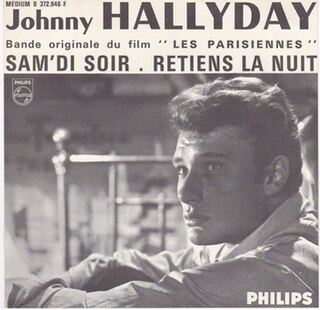
"Retiens la nuit" is a song by French singer Johnny Hallyday from his 1961 studio album Salut les copains. It was also released as an EP in February 1962 and as a single two months prior. The song was also featured in the 1962 French comedy-drama anthology film "Les parisiennes", which starred Hallyday.
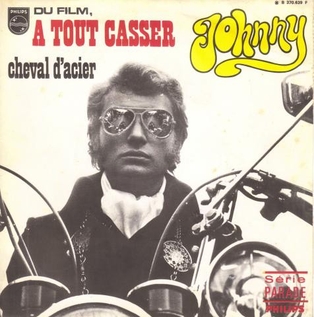
"À tout casser" is a song by French singer and actor Johnny Hallyday. It was used in the opening title sequence of the 1968 film of the same name. Hallyday also released it as a single and on his 1968 studio album Jeune homme The B-side "Cheval d'acier" also appears in the film, where Hallyday performs it on stage.
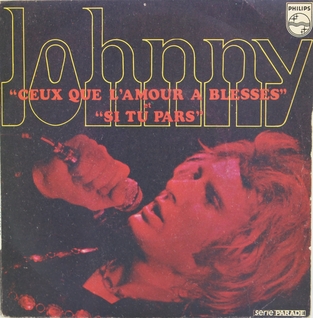
"Ceux que l'amour a blessés" is a song by French singer Johnny Hallyday. It was released as a single in January 1970.
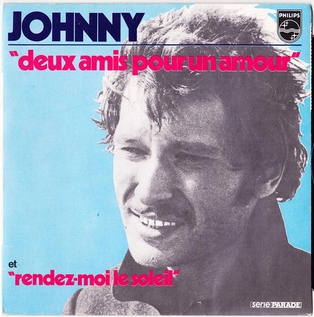
"Deux amis pour un amour" is a song by French singer Johnny Hallyday. It was released as the second and penultimate single off of his 1970 studio album Vie.

"Essayez" ("Try") is a song by French singer Johnny Hallyday. It was released on his 1970 studio album Vie as the album's third and final single in December 1970.

"Je t'aime, je t'aime, je t'aime" is a song by French singer Johnny Hallyday from his 1974 studio album Je t'aime, je t'aime, je t'aime. It was also released as the self-titled, second, and final single from the album.
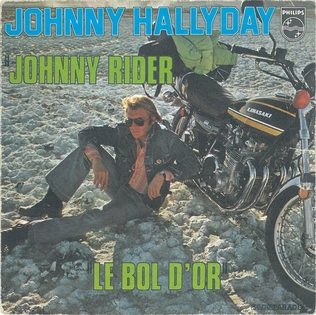
"Johnny Rider" is a song by French singer Johnny Hallyday. It was released as a single in Septmber 1974 and included on his studio album Rock 'n' Slow, released two months later.

"Ma guitare" is a song by French singer Johnny Hallyday from the 1963 film D'où viens-tu Johnny? It was also released on a double A-side single.
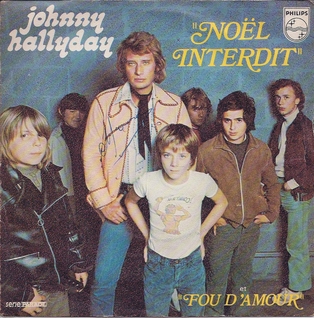
"Noël interdit" is a Christmas song by French singer Johnny Hallyday. It was released as a single in November 1973.

"Prends ma vie" is a song by French singer Johnny Hallyday. In March 1974 it was released as the lead single off of Hallyday's 1974 studio album Je t'aime, je t'aime, je t'aime.
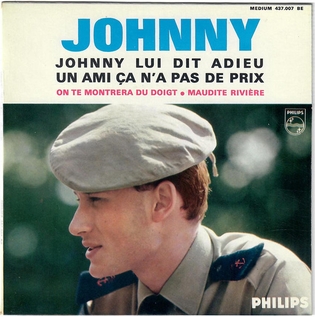
"Un ami ça n'a pas de prix" is a song by French singer Johnny Hallyday. It was released on an EP titled "Johnny lui dit adieu / Un ami ça n'a pas de prix" in January 1965.

"Comme un garçon" is a song by Sylvie Vartan from her 1967 album Comme un garçon. It was also released on an EP and as a single.
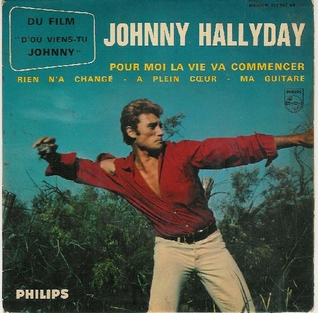
"Pour moi la vie va commencer" is a song by written by French singer-songwriter Jean-Jacques Debout and performed by French singer Johnny Hallyday. It was released in October 1963, coinciding with the release of the film "D'où viens-tu Johnny", starring Hallyday and fellow singer and future wife Sylvie Vartan, of which the song is featured on.

"Que je t'aime" is a song by French singer Johnny Hallyday. It was released on 23 June 1969 in France and on 11 September 1969 in Italy. The music has been composed in one night by the French artist Jean Renard, the lyrics have been written by Gilles Thibaut. Johnny Hallyday was looking for a strong song for his new show at Le palais des Sports. The song is a success, loved or at least known by most of the French population. The hardcore fans of Hallyday, the rock and roll' fans but also people from a more pop music atmosphere.
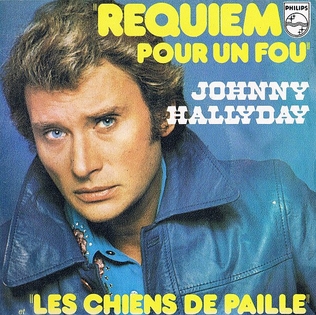
"Requiem pour un fou" is a song by French singer Johnny Hallyday. It was released in February 1976 as the lead single off of his twenty-first studio album, "Derrière l'amour", released later that year in June. Hallyday has also re-recorded the song in Italian, Spanish, and English and has also released duet versions with Bolton and Belgian-Italian singer Lara Fabian in 1996 and 1999 respectively, the ladder duet being a live performance at the Stade de France in September 1998.

"Petite fille" is a song by French singer Johnny Hallyday. It was released in August 1967 on an EP and also appeared on Hallyday's that year's album Johnny 67.

"Quelque chose de Tennessee" is a 1985 song recorded by French singer Johnny Hallyday. Written and produced by Michel Berger, it was released in December 1985 as the third single from the album Rock'n'Roll Attitude, on which it appears as the third track. It is a tribute to American playwright and screenwriter Tennessee Williams, who created A Streetcar Named Desire (1947), Cat on a Hot Tin Roof (1955), Sweet Bird of Youth (1959), and The Night of the Iguana (1961), among others. The song was a top ten hit in France and became one of Hallyday's most popular songs throughout years.




















